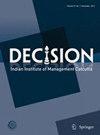体验不可能:魔术发生的客观概率如何影响观众的体验?
IF 1
Q3 MANAGEMENT
引用次数: 0
摘要
本文章由计算机程序翻译,如有差异,请以英文原文为准。
Experiencing the improbable: How does the objective probability of a magic trick occurring influence a spectator’s experience?
Magic is an art form that allows us to experience the impossible, but some magic tricks are more implausible than others. We present two experiments that examined whether the objective probability of a trick occurring by chance in fl uences how people experience the trick. In Experiment 1, participants watched different versions of a magic trick in which we manipulated the statistical probability of the trick occurring by chance. We found that the objective probability had no signi fi cant impact on how much people enjoyed the trick or how impressed they were by it. Our participants enjoyed the trick equally when there was a 25% chance of it succeeding by chance as when it was virtually impossible. The same was true for how impressed they were by the performance. However, tricks that were less likely to succeed by chance were rated as more dif fi cult and impossible. More implausible tricks resulted in more participant explanations stating they did not know how the trick was done, as well as explanations implying it was fake. In a follow-up experiment, participants were presented with vignettes describing the same trick, and they were asked to judge the magician ’ s chances of succeeding. The statistical probability of the trick occurring by chance did not affect these judgments adversely, but they did do so when the same feat was performed by a nonmagician.
求助全文
通过发布文献求助,成功后即可免费获取论文全文。
去求助
来源期刊

Decision
MANAGEMENT-
CiteScore
2.30
自引率
0.00%
发文量
27
期刊介绍:
The aim of the Journal, Decision, is to publish qualitative, quantitative, survey-based, simulation-based research articles at the national and sub-national levels. While there is no stated regional focus of the journal, we are more interested in examining if and how individuals, firms and governments in emerging economies may make decisions differently. Published for the management scholars, business executives and managers, the Journal aims to advance the management research by publishing empirically and theoretically grounded articles in management decision making process. The Editors aim to provide an efficient and high-quality review process to the authors.
The Journal accepts submissions in several formats such as original research papers, case studies, review articles and book reviews (book reviews are only by invitation).
The Journal welcomes research-based, original and insightful articles on organizational, individual, socio-economic-political, environmental decision making with relevance to theory and practice of business. It also focusses on the managerial decision-making challenges in private, public, private-public partnership and non-profit organizations. The Journal also encourages case studies that provide a rich description of the business or societal contexts in managerial decision-making process including areas – but not limited to – conflict over natural resources, product innovation and copyright laws, legislative or policy change, socio-technical embedding of financial markets, particularly in developing economy, an ethnographic understanding of relations at a workplace, or social network in marketing management, etc.
Research topics covered in the Journal include (but not limited to):
Finance and Accounting
Organizational Theory and Behavior
Decision Science
Public Policy-Economic Insights
Operation Management
Innovation and Entrepreneurship
Information Technology and Systems Management
Optimization and Modelling
Supply Chain Management
Data Analytics
Marketing Management
Human Resource Management
 求助内容:
求助内容: 应助结果提醒方式:
应助结果提醒方式:


